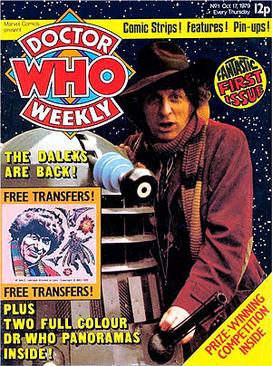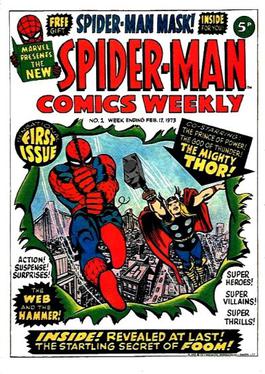
2000 AD is a weekly British science fiction-oriented comic magazine. As a comics anthology it serialises stories in each issue and was first published by IPC Magazines in 1977, the first issue dated 26 February. Since 2000 it has been published by Rebellion Developments.

Doctor Who Magazine is a magazine devoted to the British science fiction television series Doctor Who. Launched in 1979 as Doctor Who Weekly, the magazine became a monthly publication the following year. With 13 issues a year, as well as producing triannual deluxe Special Editions (2002–) and Bookazines (2013–), the publication features behind the scenes articles on the TV show and other media, as well as producing its own comic strip. Its founding editor was Dez Skinn, and the longest-serving editor was Tom Spilsbury who served from 2007 to 2017. He was succeeded by Marcus Hearn, who took over from Spilsbury in July 2017. The incumbent editor is Jason Quinn, who took over from Hearn in September 2023. DWM is recognised by Guinness World Records as the longest running TV tie-in magazine, celebrating 40 years of continuous publication on 11 October 2019. The magazine published its 600th issue on 1 February 2024.

Roy of the Rovers is a British comic strip about the life and times of a fictional footballer and later manager named Roy Race, who played for Melchester Rovers. The strip first appeared in the Tiger in 1954, before giving its name to a weekly comic, published by IPC and Fleetway from 1976 until 1995, in which it was the main feature.

ESPNcricinfo is a sports news website exclusively for the game of cricket. The site features news, articles, live coverage of cricket matches, and StatsGuru, a database of historical matches and players from the 18th century to the present. As of March 2023, Sambit Bal was the editor.

Marvel UK was an imprint of Marvel Comics formed in 1972 to reprint US-produced stories for the British weekly comic market. Marvel UK later produced original material by British creators such as Alan Moore, John Wagner, Dave Gibbons, Steve Dillon, and Grant Morrison.

Ralph was a monthly Australian men's magazine that was published by ACP Magazines, a division of PBL Media between August 1997 and July 2010. The format and style of Ralph was similar to other men's magazines, such as Maxim and Loaded.

Soccer AM is a British football-based comedy talk show, produced by Sky Sports. It aired from 20 August 1994 to 27 May 2023 on Sky Showcase, Sky Sports Premier League and Sky Sports Football. From 2010, the programme was put on a short broadcast delay in order to edit bad language and/or inappropriate content from guests.

Grit is a magazine, formerly a weekly newspaper, popular in the rural U.S. during much of the 20th century. It carried the subtitle "America's Greatest Family Newspaper". In the early 1930s, it targeted small town and rural families with 14 pages plus a fiction supplement. By 1932, it had a circulation of 425,000 in 48 states, and 83% of its circulation was in towns of fewer than 10,000 inhabitants.

TV Week is a weekly Australian magazine that provides television program listings information and highlights, as well as television-related news.

Tiger was a weekly British comics periodical published by Amalgamated Press, Fleetway Publications and IPC Magazines from 11 September 1954 to 30 March 1985. The title was initially launched in a large tabloid size to mimic newspapers; while it featured some action-adventure stories Tiger contained a large number of sport strips. The most famous of these was "Roy of the Rovers", which debuted in the first issue and was the comic's most popular feature, eventually transferring to its own comic in 1975. Tiger would go on to become one of the company's longest-running titles, with 1,573 issues published before being merged with Eagle in 1985. Over the course of its run, Tiger featured columns by numerous famous sports figures, including Ian Botham, Geoff Boycott, Tony Greig, Trevor Francis and Charlie Nicholas.

Parade was an American nationwide Sunday newspaper magazine, distributed in more than 700 newspapers nationwide in the United States until 2022. The most widely read magazine in the U.S., Parade had a circulation of 32 million and a readership of 54.1 million. Anne Krueger had been the magazine's editor since 2015.

The Daredevils was a comics magazine and anthology published by Marvel UK in 1983. Aimed for a more sophisticated audience than typical light superhero adventures, The Daredevils featured Captain Britain stories by Alan Moore and Alan Davis paired with reprints of Frank Miller's Daredevil stories. It has been speculated this was in response to Dez Skinn's new anthology Warrior.

Match, stylised as MATCH or MATCH!, is a weekly British football magazine aimed at the teenage and pre-teenage market. First published in 1979, the magazine had a circulation of 57,108 copies in December 2010. The magazine includes interviews, a skills school, quizzes and a weekly round-up of results, tables and player ratings from the four main English divisions and the Scottish Premier League in MatchFacts. It mostly covers teams and players in the English Premier League, but also has a limited coverage of La Liga, Serie A and international football.

TV Comic was a British comic book magazine published weekly from 9 November 1951 until 29 June 1984. Featuring stories based on television series running at the time of publication, it was the first British comic to be based around TV programmes; it spawned a host of imitators.
Scorcher was the name of a football-themed British comic magazine published by IPC between January 1970 and October 1974. Scorcher featured various well-known comic strips, such as Billy's Boots, Bobby of the Blues and Lags Eleven, a story about a prison football team. In addition, the Nipper strip was absorbed from the Score comic, and Hot Shot Hamish made its first appearance after that. Some of these stories later found homes in Roy of the Rovers and in Tiger.
Placar is a monthly Brazilian sports magazine. Its first edition was issued by Editora Abril. on March 20, 1970, and since then it has become the most successful sports publication in Brazil, even though it focuses fully on football. It is currently published by Editora Abril.
Sport was an American sports magazine. Launched in September 1946 by New York–based publisher Macfadden Publications, Sport pioneered the generous use of color photography – it carried eight full-color plates in its first edition.
Roy of the Rovers comic magazine was launched as a weekly on 25 September 1976, named after the established comic strip of the same name that first appeared as a weekly feature in the Tiger on 11 September 1954. The title ran for 851 issues, until 20 March 1993, and included other football strips and features. In February 1989, the magazine merged with the similarly themed Hot Shot, and was known for a brief time as Roy of the Rovers and Hot Shot, but reverted to its original title shortly afterwards.

Spider-Man Comics Weekly was a Marvel UK publication which primarily published black-and-white reprints of American Marvel four-color Spider-Man stories. Marvel UK's second-ever title, Spider-Man Comics Weekly debuted in 1973, initially publishing "classic" 1960s Spider-Man stories.
City Magazines was a British publisher of weekly comics and men's magazines that operated from the mid-1950s to the mid-1970s. The company's most notable publications were comics magazines based on licensed television properties, including TV Century 21 and Lady Penelope, both of which featured comics based on Gerry Anderson's Century 21 Productions Supermarionation shows.














